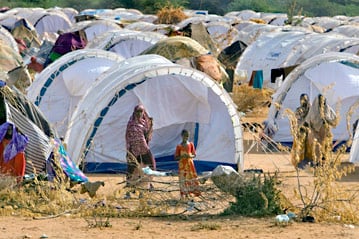The High Commissioner in the Balkans
The High Commissioner in the Balkans
High Commissioner Sadako Ogata arrives in Kosovo today - one year after the start of the NATO bombing campaign and the one of the largest and most complex refugee crises in UNHCR's nearly 50-year history.
Mrs. Ogata is nine days into a 13-day mission to Croatia, Bosnia-Herzegovina, Serbia, Montenegro, former Yugoslav Republic of Macedonia and Albania. She is scheduled to arrive in Kosovo by road from Montenegro around midday today and - security allowing - will go to the troubled northern city of Mitrovica before heading to Pristina. She is particularly concerned about the treatment of the remaining minorities in the province and Mitrovica is one of the most worrisome examples of that problem.
Although Kosovo remains a major concern for the entire international community, the High Commissioner says she does see some cause for cautious optimism elsewhere in the region.
In her meetings in Croatia, for example, President Stipe Mesic and other members of his new government reiterated that Croatia now welcomes the return of all its citizens. Five years after Dayton and very slow progress on minority returns, this is welcome news.
UNHCR and the rest of the international community are also watching closely for the first results of a March 9 joint declaration by Croatia and the Republika Srpska in which they pledge the return of 2,000 refugees from each within three months. UNHCR believes such a return could finally break the bureaucratic and political logjam that has been blocking returns.
Although there have been only 25,000 returns to Republika Srpska since Dayton, 13,000 of them were last year - more than all previous years combined.
Spontaneous returns are also on the rise elsewhere in Bosnia and Herzegovina.
Mrs Ogata is encouraged by the potential impact of the Stability Pact promoting cross-border returns and economic initiatives and new property legislation in Croatia and Bosnia Herzegovina which could remove much of the bureaucratic red tape blocking minority returns today.








